- Home
- Franz Kafka
The Meowmorphosis Page 9
The Meowmorphosis Read online
Page 9
“What did you dream, the night before you changed into an animal?” he asked his jailor, so that he could cease asking himself.
“The tabby Josef K does not like us to remember our lives, for that opening he speaks of is always behind us, the cloaca of the soul, and he fears to fall into it, much as he pretends it is not so; but I will tell you what I dreamt of, for I suspect that you dreamt it, too, your night of anxious dreams. I suspect we all dreamt it, and perhaps one day before death we will dream it again, or its reverse, its mirror, everything happening in opposition to the original so that when we leave our corpses on the street they are suddenly once more old Bohemian men gone to paunch and wrinkles, with tattered waistcoats half a century old barely covering their nakedness. I dreamed of an insect—I could not tell what sort, only that it was blackish brown and large, though its size changed often and sometimes it could hide from me, scurrying beneath furniture, and sometimes it was so large it filled my vision, a terrible six-legged thing that squeaked wretchedly and waggled its miserable wings as if it meant to fly away from itself. I dreamed this insect dwelled in an apartment little different from the one I recall from my days as a man, with chairs and sofas and sinks indistinguishable from my own, but not my own, only of the same type and general appearance, for there is little difference in the homes of men of our station, so eager are we to belong and style ourselves alike so as to avoid the slightest glimpse of strangeness leaking into our waistcoats and sinks and evening chairs. The insect rose up before me as if to injure me, but in the end it did not, merely slumped down and crawled into a bed that was not my bed but looked very much like it, burrowing its triangular head under the covers and weeping softly. As I watched, the insect tossed its rigid body as if occupied by anxious dreams of its own, and I must have let my head droop and sleep in the night, for when I woke, and it woke, the insect had become a novelist with pomade in his hair, lying on his back and staring at the ceiling as if he had no notion of how he had changed or that he had. He lay on his soft, sweaty back and saw, as he lifted his head a little, his flat abdomen covered in a striped shirtfront. The blanket, just about ready to slide off completely, stayed in its proper place. His legs—so few now—pitifully thin compared to the rest of his more or less healthy person, lay motionless on the mattress.
“ ‘What’s happened to me?’ he said softly, and I had no answer for him. I only dreamed; I could not help. His room, a proper room for a human being if somewhat too small, lay quietly between the four well-known walls. The novelist’s glance then turned to the window. The dreary weather—the raindrops were falling audibly onto the metal window ledge—made him quite melancholy. ‘If I keep sleeping for a while, all this will disappear,’ he whispered, putting his hands over his face. ‘O God, what a relentless job I’ve chosen! Day in, day out, the pen in my hand alone. The stresses of writing are much greater than I ever imagined, and, in addition to that, I have to cope with the problems of meaning, the worries about metaphor and symbols, irregular bad food, fleeting human relationships that never come from the heart, friends who look at me and see only an investor or a poor sack of a man with the soul of a crawling thing. To hell with it all! None of it has a meaning—well, today I meant to give it one; I meant to take up each of my stories and give them new endings, in which all would be explained and made well, in which no one could be left wondering how they had managed to get themselves into any unhappy state, in which the world would be well ordered and calm. I meant to do all of this, but now I find myself this morning changed utterly into a beast, and all I know is fear, my heart degraded and alone, my lungs filling up with water that might as well be tears.’ I tried to argue with the novelist, to tell him that, on the contrary, he had been a monster that made my soul shiver with cold, but now he seemed quite respectable, if in need of a bath and a solid breakfast; but he would not hear it, only went to his desk and held sheaf after sheaf of paper to his heart, tearing them into pieces. He coughed horribly, quite horribly, and a spot of blood spattered upon the wall. ‘I cannot speak so that I am understood,’ he whispered. ‘I try to speak like a man, well and orderly, and all that comes out is a series of alien clicks and squeaks full of dark patterns and crawling, anxious terrors, and I am never understood and my stories are warrens where no one may find their way. I know myself, and I know I am a monster, that I have always been a monster—it was only that, for a brief moment, no one knew it, and I looked somewhat like a man, from the right angle—but I am a creature and a monster and I know it, I have always known it.’ He slid back again into his earlier position. ‘This getting up early,’ he moaned, ‘makes a man quite melancholy.’ And at that moment, I believe, I became a cat, not in the dream but in the world—in the dream I remained a man, and though never before had I felt so uncharitably toward a soul, I suddenly found the novelist tiresome and wished only to be about my own business and cease listening to his desolate speech; besides, the sun was streaming in the window in a most enticing manner, and I thought I spied a bit of string in the corner, and both of these seemed infinitely more absorbing than the novelist, who in the end was more endearing as an insect. This is the essence of a cat’s psychology: we can only endure humans for so long before, well, there is a sunbeam or a bit of fish in the larder, and who can really be asked to listen to modernist symbolism when such things are at hand? I curled up in the sunbeam, with my suit flowing around me like a tail, and the novelist said: ‘Why did I change?‘ and I answered with a yawn, for truly I did not care, but ventured that I expected it was all to do with the state of the modern world and man’s alienation from man, somehow. When I woke from this uneasy dream, I was as you see me now, and the howls of inmates echoed around me.”
“As a psychiatrist, you could not offer some insight into your own dream?”
“Psychiatry is a dog’s profession, not a cat’s—a cat thinks what he thinks and that is all. He does not worry himself about it, and whatever he thinks, that is the most appropriate and, indeed, excellent thought for a cat to have at that moment. You must understand that each cat is in essence a psychopathology all his own, quite capable of any crime a man could imagine, limited only in size and opposable thumbs; lacking these, we simply connect thought to deed without any intervening neuroses: What we desire, we perform, and that is what is meant by freedom. A dog, on the other hand, wishes to be approved of, by other dogs and by his master, and thus it is the dog who must constantly analyze the motivations and internal mechanisms of others and change his behavior to suit them. Once I was a cat I understood this immediately and forswore my former profession as useless and really rather beneath me. But if you would force me to interpret it, I would tell you that men fear they are monsters at their core, that the civilized skin covers only hideousness and hunger for mire and waste, a driving hunger for death, for rot, for everything that is the opposite of beauty; however, cats know they are monsters and have no particular qualms about it, and besides, their monstrous souls are hidden within an extremely adorable disguise, and few would ever suspect what lies beneath fluffy paws and a fat little belly. Thus cats are not tortured by the idea that one day their insides might be shown to all the world, their fine waistcoats revealed a lie and all for naught. But when I was a man, this was a thing I feared: that I had always been a creature of the dark, only one day having managed to pull on a man’s mask, with the certainty therefore that I would be caught out eventually. But I really am tired now and not a little bored, so I believe that’s enough for one day. We can take our leave of each other, for the time being at least. I expect you’ll want to go back home now, won’t you?”
“To my family?” Gregor asked. “I thought I was under arrest.” He said this with a certain amount of defiance because, although his friendship had not been accepted, he was feeling more and more independent of all these other cats, especially since Josef K had not reappeared. Surely he was being played with. “How can I go back home when I’m under arrest—indeed, tried and convicted?”
�
��I see you’ve misunderstood me,” said Franz, who had begun to settle down into a nap, hunching his body so that his shape resembled nothing so much as a roasted chicken. “It’s true that you’re under arrest, but that shouldn’t stop you from carrying out your affairs. And there shouldn’t be anything to stop you getting on with your usual life.”
“In that case it’s not too bad, being under arrest,” Gregor said, and crept up close to Franz, sniffing at his pink nose to catch the scent of truth from him, or the scent of a trap being laid, such as telling him he was free to go when in fact he was not and would be immediately chased down by the other cats and tried doubly for some other crime he knew not and would not be told, on top of desertion and trying to escape.
“We never meant that it should be anything else,” Franz replied.
“It hardly seems to have been necessary to notify me of the arrest, in that case, or even hold the trial, or bring me here at all,” Gregor said, and approached even closer. A few other cats, calicos and blues, mostly, had also come closer. All of them gathered into a narrow space by the door to see what Gregor might say.
“That was my duty,” said Franz, his eyes serenely shut.
“A silly duty,” said Gregor, unyielding.
“Maybe so,” Franz replied, “only don’t let’s waste our time carrying on like this. I had assumed you’d be wanting to go home. Since you’re paying such close attention to every word, I’ll add this: I’m not forcing you to go home, I’d just assumed you wanted to. After all, you stayed in that place no matter how unpleasant it was to you before, even letting that unthinkable and rather gauche strap remain around your neck, and perhaps you’ve now sown your oats and had your adventures on the town and are ready to be a house cat once more, as you were really never anything else. And to make things easier for you, and to let you get home with as little fuss as possible, I’ve put these three gentlecats—colleagues of yours, I think—at your disposal.”
“What’s that?” Gregor exclaimed, and looked at the three in astonishment. He could only remember seeing them in hallways or during holidays when other tenants brought their pets to various celebrations, but these ginger, well-fed young cats were indeed house pets from his building—not colleagues of his, that was putting it too high and it showed a gap in Franz’s understanding of him, but they were nonetheless about and underfoot from time to time, and he remembered them. He even recalled their odd names: Rabensteiner, with his stiff demeanor and bushy orange tail; Kullich, with his blonde fur; and Kaminer, with his involuntary grin caused by white patterns on his grey muzzle and cheeks. “Good evening,” Gregor finally said, extending his paw somewhat ridiculously to the other cats as they yawned in his direction. “I didn’t recognize you at all. So, we’ll go home now, shall we?” The cats sniggered and nodded enthusiastically, as if that was what they had been waiting for all the time, except that Gregor had not given them leave to go, but now that he had, they felt eager to be off. Gregor sat where he was, thumping his tail back and forth, and watched them squeeze through the opening in the wall they had all come through before the trial; the last to go, of course, was the apathetic Rabensteiner, who had broken into no more than an elegant trot. Kaminer got a bit of mold in his fur, and Gregor, as he’d often had to do when he encountered the tom in the hallway, forcibly reminded himself that the cat’s grin was not deliberate, that in fact he wasn’t able to grin deliberately.
Once they had gone, Gregor began to quiver and shake with confusion and trepidation. He did not wish to go home—had he not escaped with alacrity?—and further distress his family, yet he felt these narrow-eyed cats had carved up his heart for their plates and left him with no particular idea of anything in the world, sense or nonsense, and it was really very rude to do that to a fellow; in fact, Gregor felt that if one did that, one then had some sort of responsibility for that fellow, and Josef K having gone off to enjoy cream and herring and a harem or whatever his particular peccadilloes might be, that responsibility seemed very clearly to fall to Franz, and Gregor meant to hold him to it, though really the other three could fall off a bridge, so little did he care what befell them now that they were out of the warren and trotting along home to Mrs. Grubach’s warm and comfortable lap and also very likely a couple of chicken livers or a bit of sausage.
“So,” Gregor called out, kneading his paws against the ground as if this sudden realization needed more room, and addressing all the straggler cats who had come to view his misery, “all of you are working for this organization; I see now that you are all the very bunch of cheats and liars symbolized by the cockroaches in Franz’s dream, for you’ve all pressed yourselves in here to listen in and snoop on me, though you gave the impression of having formed into a proper trial, with factions and arguments, with some of you being for Josef K and some of you for decency and breakfast! Well, I hope you haven’t come here for nothing, I hope you’ve had some fun—let me go or I’ll bite you,” he shouted to a quivery old Persian who had pressed himself especially close to him—“or else that you’ve actually learned something. And so I wish you good luck in your vicious legal trade.” He briskly wiggled his paw where some bit of filth had gotten stuck to it, surrounded by a silence caused perhaps by the completeness of their surprise. However, the herd of cats seemed to move even more quickly than Gregor, for now they were pressing in even closer—now, when he tried to leave, as they had said he could!
“One moment,” Franz said without opening his eyes, his unperturbed countenance quite like a sphinx. Gregor stood where he was but looked at his own paws, rather than at his jailor. “I merely wanted to draw your attention,” said Franz, “to something you seem not yet to be aware of: no one is keeping you here, nor should anyone have a wish to. In fact, we want nothing at all from you. We belong to the court of the cats, so why would we want anything from you? The court doesn’t want anything from you. It accepts you when you come, and it lets you go when you leave.” Behind him, the noise of the assembly rose as it became lively once more—probably, Gregor thought, beginning to discuss these events as if making a scientific study of them. “But wherever you go, you will carry with you the knowledge that you are a convict, and your execution shall be just that: the execution of your respectable self, as a cat or a man, and its replacement with a criminal mind, a dark and sneaky place. It’s a remarkable apparatus.” Franz slitted his eyes open; it appeared that he had responded to Gregor’s speech only out of politeness, when he had been just about ready to descend into a highly satisfactory nap. Interest in this execution was not really very high even among the members of the court. Here in the small, deep, underground warren, closed in on all sides by furry bodies, Samsa wore an expression of such doglike resignation that it quite offended the cats, who were accustomed to a certain level of personal pride, whereas Gregor was beginning to look as if one could set him free to roam around the slopes and would only have to whistle at the start of the execution for him to return.
“But why would I return home?” Gregor said with much unhappiness. “The tenor of my family will not have changed in the smallest amount toward me, nor will they be any better off financially or spiritually for my presence. My sister will still torment me with her attentions, my father will refuse to acknowledge me, my mother will weep when she sees me, and my landlord will still demand the rent. And I will have nothing, nothing for any of them. Sooner or later my father will put me out on the street in desperation—or worse, throw me in a sack and drown me in the river, sell me to a circus run by some flea-bitten madman, or simply club my head in; and he will not mean it badly—I do not mean to sound like an ungrateful son—but he will be fully within his rights, and I within his power as, yes, you are right, I have always been. But that seems unlikely to change now, and so it seems to me that to return home is to die, to commit myself to my own death, which I suppose is an execution after all, but I still have no real idea what I have been convicted of, unless it is to have been an unhappy man and to have gotten no better as a cat,
which I think you know is not an actionable offense; though the tabby Josef K said that the cat stands on the threshold between life and death, surely you cannot mean me to choose to die, to choose to return to that apartment where death surely awaits me in one form or other.” Gregor was pleased at the tension among all the people there as they listened to him; a rustling rose from the silence, which was more invigorating than the most ecstatic applause could have been. “There is no doubt,” he said quietly, “that there is some enormous organization of cats determining what is said by all of us here. In my case, this includes my prosecution and even what I am saying now, which I suppose constitutes my defense—an organization that employs large muscular cats as intimidators, long-winded tabbies who call themselves bank clerks and judges of whom nothing better can be said than that they are not as arrogant as some house cats I have known in my life. And what, gentlecats, is the purpose of this enormous organization? Its purpose is to arrest innocent kittens and wage pointless prosecutions against them that, as in my case, lead to no result. And then to send them home with an invisible noose around their necks or at least their minds—send them home to die. How are we to avoid cats as a nation becoming deeply corrupt when everything is devoid of meaning? When a man may dream of a novelist and wake up a cat and then be expected to draw some meaning out of it all that is not a colossal joke, that is any more than a photograph of that poor cat with some amusing headline written beneath it for fools to cackle at? It is all for amusement, and that is why innocent, humble cats who never bothered anyone are humiliated in front of crowds rather than being given a proper trial—as if a proper trial is possible when there has been no crime!”

 Diaries of Franz Kafka
Diaries of Franz Kafka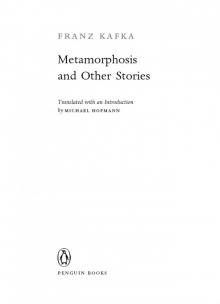 Metamorphosis and Other Stories
Metamorphosis and Other Stories The Castle: A New Translation Based on the Restored Text
The Castle: A New Translation Based on the Restored Text The Complete Stories
The Complete Stories In the Penal Colony
In the Penal Colony The Trial
The Trial Amerika
Amerika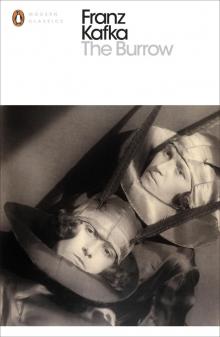 The Burrow: Posthumously Published Short Fiction
The Burrow: Posthumously Published Short Fiction Sons
Sons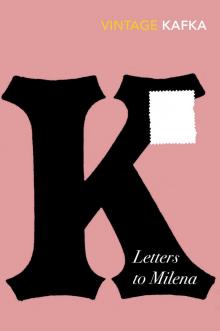 Letters to Milena
Letters to Milena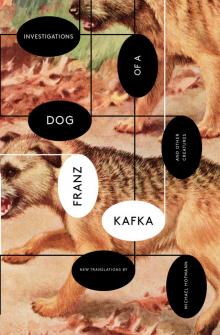 Investigations of a Dog: And Other Creatures
Investigations of a Dog: And Other Creatures Collected Stories
Collected Stories The Great Wall of China
The Great Wall of China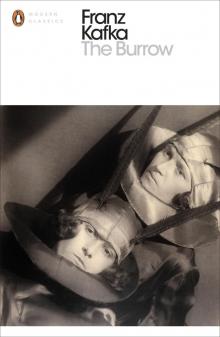 The Burrow
The Burrow The Castle
The Castle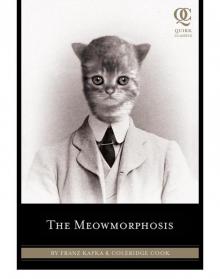 The Meowmorphosis
The Meowmorphosis The Sons
The Sons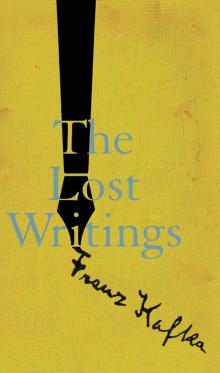 The Lost Writings
The Lost Writings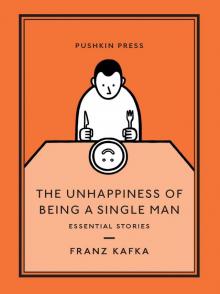 The Unhappiness of Being a Single Man
The Unhappiness of Being a Single Man Amerika: The Missing Person: A New Translation, Based on the Restored Text
Amerika: The Missing Person: A New Translation, Based on the Restored Text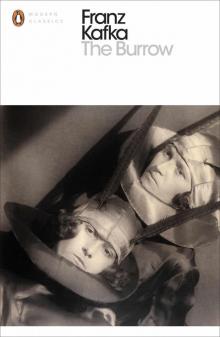 The Burrow: Posthumously Published Short Fiction (Penguin Modern Classics)
The Burrow: Posthumously Published Short Fiction (Penguin Modern Classics)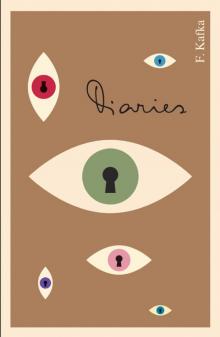 The Diaries of Franz Kafka
The Diaries of Franz Kafka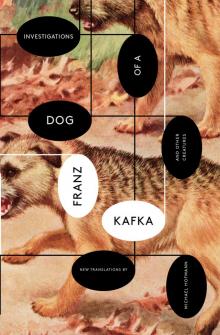 Investigations of a Dog
Investigations of a Dog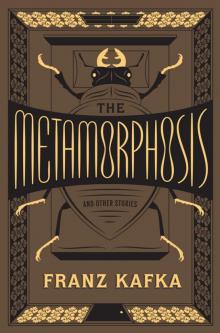 The Metamorphosis and Other Stories
The Metamorphosis and Other Stories The Trial: A New Translation Based on the Restored Text
The Trial: A New Translation Based on the Restored Text